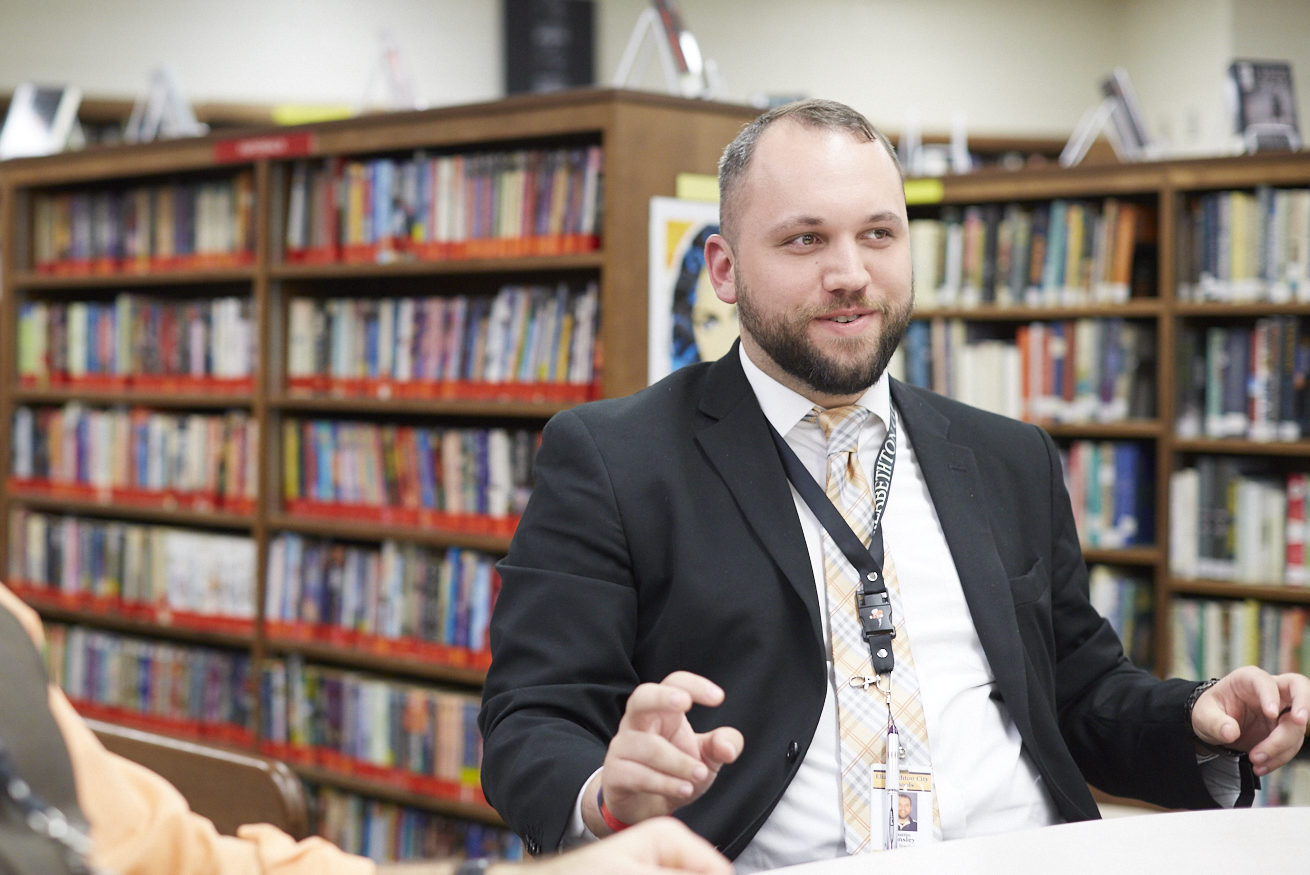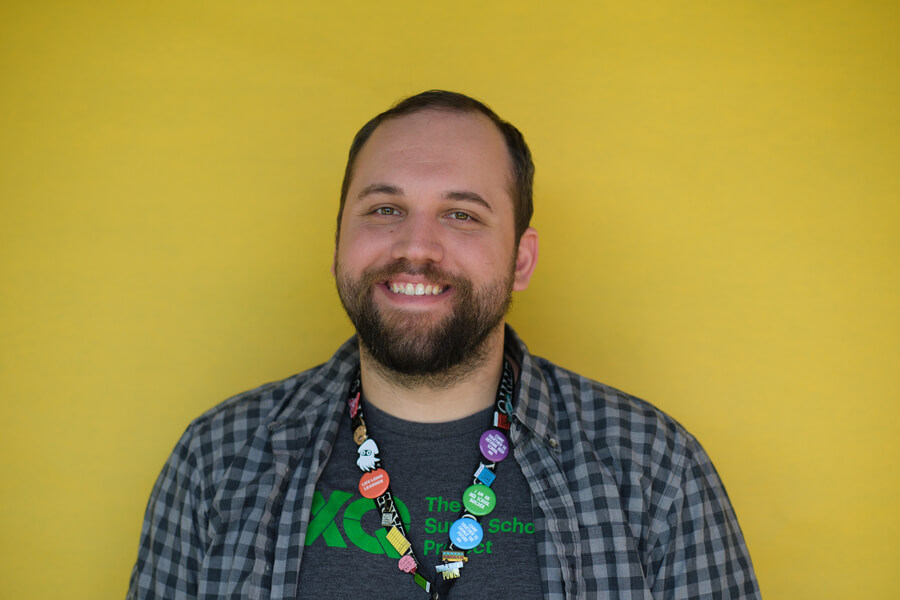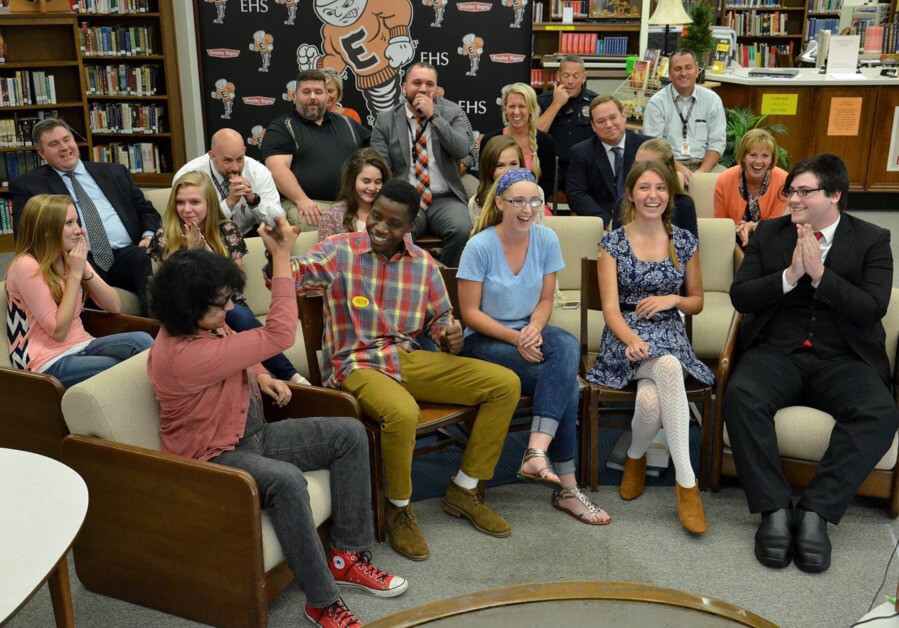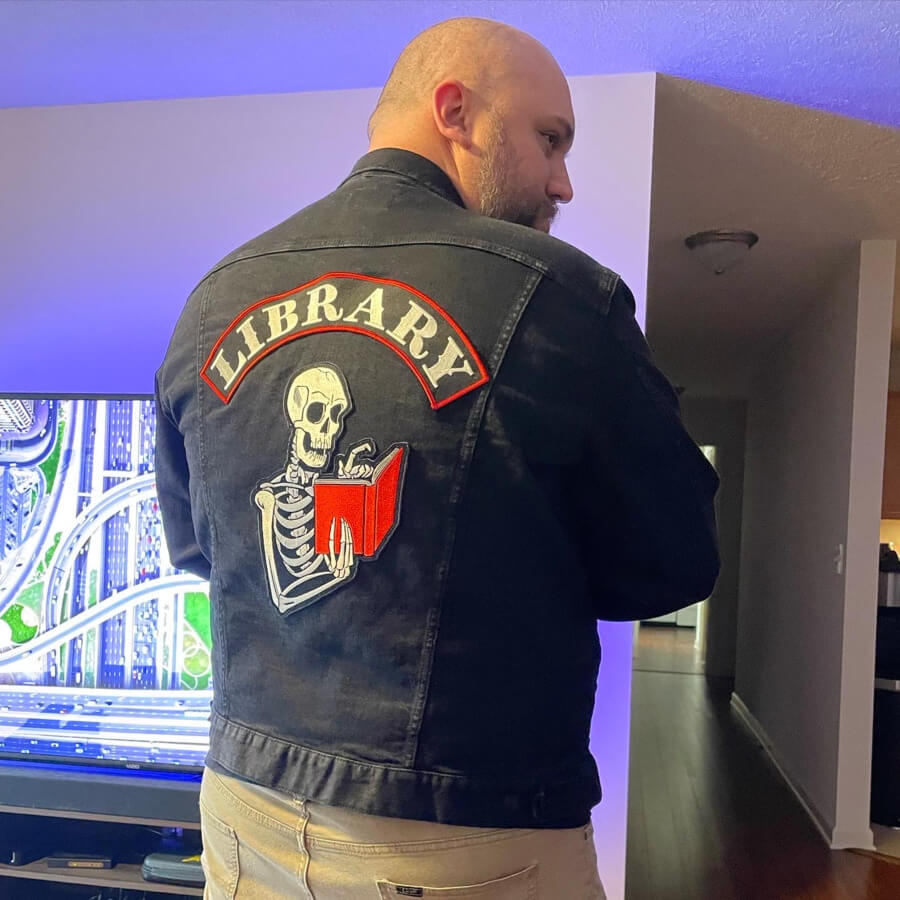Supporting Our Libraries: Insights from a High School Librarian
When I was hired as the English teacher at PSI High, an XQ Super School,…


When I was hired as the English teacher at PSI High, an XQ Super School, my school leader encouraged me to build a classroom library. I started with graphic novels like “Maus,” “March,” and “Persepolis.” I added the best fiction for high schoolers like “The Curious Incident of the Dog in the Nighttime,” “Homegoing,” and “The Kite Runner.” I found textbooks to help students learn about rhetoric, world literature, and academic writing. I was incredibly privileged to build this little library, but I thought about the students and schools whose libraries are fighting to be more than just computer labs and testing centers.
The American Library Association found libraries contribute to student academic growth. School libraries are particularly important in underresourced communities—where students are almost twice as likely to graduate when there is a certified librarian on deck. However, funding cutbacks coupled with the demands of standardized testing mean libraries are becoming less a place of inquiry and discovery, and more a hub for storage and testing accommodations. If we are to transform high schools, we have to transform the way we approach our school libraries.
To help understand the significance of school libraries, I reached out to my favorite librarian, Dustin Hensley of Elizabethton High School, an XQ Super School in Elizabethton, Tennessee. Dustin was recognized for his transformative work by being named one of Library Journal’s Movers and Shakers in 2021, winning a grant from Dollar General Literacy Foundation, and a grant from National Endowment for the Humanities.
Over a recent Zoom call, I asked Dustin more about his role at Elizabethton, and how we can do more to help school libraries. Dustin illuminated the role libraries play in the 21st century and why they’re more important to us now than ever. Below are excerpts from our conversation.

What is the role of a school Librarian?
Dustin said he considers being a librarian “an advocate for students.”
“My favorite thing about being a librarian is that I never have to be the person judging the abilities of students,” he explained. “I’m just there to help them, to cultivate their self-interests.” Dustin is in his early 30s and grew up in the Appalachian region where he works. Scratching his grizzly beard, he explained his philosophy as a librarian. “I will help guide you to where you need to be. We’re all learners together like we’re all humans here.”
Behind Dustin rests a Boba Fett costume a student gifted him. We laugh about how it’s two sizes too small whenever he wears it, but the message it sends to students is more than just an appreciation of the Star Wars universe and pop culture. Like museums, school libraries carefully curate information for students to engage with, often without knowing what teachers plan throughout the school year. This means librarians are at the intersection of self-interest and guided learning.
“This is just the place where you can come and learn and I will help guide you to what you’re wanting to learn,” said Dustin. “But I’m not the person that’s going to necessarily have to teach everything. I’ve curated information. I know the best places to go find it, but my ultimate goal is for you not to need me.”
Study after study highlights how increased staffing and more adequate funding for school libraries contribute to positive gains in student achievement, ranging from greater success in readings scores to improved academic writing. Even with tools like Google search and social media making access to information easier than before, librarians are trained to vet and compile tools and resources that support student learning in the classroom. Moreover, school libraries can provide numerous sources for students to engage with outside of their specific courses, and help teachers research materials for their classrooms. Exposing students to different tools, cultures, and perspectives helps improve student learning and well-being.
Libraries Can Help Stop Misinformation
Dustin and I connect on our similar instructional philosophies. I thought of my English classroom as a literacy workshop where we learned to identify and create meaning from the world around us. However, even with the good work happening in ELA classrooms across the country, a more informed, equitable society cannot come to fruition without the support of our library systems.
“Our goals as librarians are to provide information literacy skills,” Dustin explained, so students can go out into the world and no longer need a librarian. “They can verify information, look at two pieces of information and say, ‘Okay, I trust this because I can vet the sources and everything.’”
Over the past decade, how the public consumes information has drastically changed. Many adults today haven’t received proper media literacy education, let alone addressed it in their high school years. Librarians and teachers have collaborated to address these evolving social spaces and prepare students with the critical thinking skills needed to navigate these complex ecosystems. Because as students spend more time online, they’re at a greater risk of coming across misinformation about issues they care about.
“I think the library is more important now than it’s ever been because there’s so much misinformation out there,” Dustin said. “The majority of misinformation that young people get is from TikTok. What they’re looking at is providing them with a great deal of misinformation. So there needs to be someone who is trained to teach information literacy, and that’s a school librarian.
“A lot of people might not realize, but school librarians require a master’s degree at minimum to have their position,” he added. “We’re trained educators, and we’re also trained in teaching information literacy. So how do you help people get the best information possible?”

Libraries are a Space for Equity
Dustin shared with me how librarians can spark curiosity in students to supplement their academic journeys. “What I’ve wanted this space to become is a place where we just learn together, where no one comes in as the expert,” he said.
Elizabethton High School applied to become an XQ Super School because Dustin learned about the competition in 2015. He was originally just looking for a way to renovate his musty library, which had old carpeting, lace, and furniture from the late 1970s. He’d found the average print year of books was 1981. Even with the library well-stocked at around 13,000 books for students, Dustin pulled more than 4,000 outdated books and worked to make the space morw inviting; he said student visits to the library doubled to nearly 36,000 in his first year.
Dustin believed he could improve the library more, and help transform the school for students, with a grant from XQ. He and the rest of the application team went straight to students for ideas.
“What would you wanna do differently with education?” Dustin said they asked the kids. “They kept saying, ‘Well, I’d prefer not to do this. I’d prefer not to do that.’ It harkened to ‘Bartleby, the Scrivener’ from Herman Melville.”
The students didn’t want more worksheets and tests. Their desire for more learning in the community and an entrepreneurship class shaped the school’s application to XQ. Dustin has been helping them with their projects and classwork ever since.
A student-centered learning environment promotes a space for equity–a crucial factor for transforming high schools. School libraries are both an extension of learning from the classroom and a hub for students to have free and fair access to many resources. If classrooms are finding limitations in space and time, the library can be a structure of relief and ingenuity.
Whether a student is working on a research paper, searching through an academic database, or prepping a resume, libraries are “the most equitable space we have,” explained Dustin. “It’s built for everyone. There’s no one specific target demographic for a library. We’re here for everyone, no matter who you are.”
Why Libraries Need Our Support
As the American Library Association highlights, recent trends indicate there has been “repressive pushback by those who believe that a more diverse and just society poses a threat to their beliefs and their way of life.” Libraries, especially in schools, are designed to be a central hub of equity and access. The rising trend to ban particular books is heartbreaking to witness.
There’s been an alarming increase in book bans pushed by advocacy groups focusing on topics such as race, language, and gender in the last year. But book bans don’t solve any real problems schools are facing, especially in a post-pandemic world. They won’t help reluctant readers, they won’t improve math scores, and they most certainly won’t improve literacy levels.
Without weighing in too deeply on the topic, Dustin did share this thought.
“So there is this idea in librarianship from Dr. Rudine Sims Bishop called mirrors, windows, and sliding glass doors,” he explained. “Books should be mirrors in which you can see yourself. Books should be windows where you can look into the lives of other people, and books should be sliding glass doors where you can actually walk into those worlds of other people.”

How You Can Support Students
My conversation with Dustin helped me better understand how necessary it is for us to continue to advocate and support our library systems—whether in the school or our local communities. In high schools, libraries are at the forefront of teaching students critical media literacy skills they’ll need for our evolving future. Skills that match our XQ Learner Outcomes: Masters of Fundamental Literacies and Original Thinkers for an Uncertain World. Libraries also help build meaningful relationships, which are at the heart of our XQ Design Principles.
I asked Dustin, what do you like most about your work?
“Building relationships with students,” was at the top of his list, as well as with his coworkers. “That is my way of finding the best book for students. It’s learning about who they are as an individual. I can suggest a book based off a quick, ‘Hey, what are you into?’ ‘Well, I enjoy this.’ ‘Okay, here are some books about that topic.’”
But once he gets to know a student better as a person, he can narrow down his recommendations. “Part of that is learning [which] students that are reluctant readers and just…putting books on display,” he explained. “Inevitably they will always eventually walk up to me with that book. I love it whenever that happens.”
The National Center for Education Statistics (NCES) at the Department of Education found that over 8,800 schools do not have a library media center. Out of the nearly 90,000 schools across the country, almost 40 percent do not have a full-time librarian to service the school. To transform high schools and make learning better for all students, we need to support our libraries and librarians.
How does your school library support your students? What kind of projects do you and your library build for them? Share with us on social using #ReThinkHighSchool
With your coffee:
“Authencity in Action: An XQ School Knowledge Exchange.” Two years ago, Dustin shared some takeaways after touring High Tech High in San Diego, California. How do observations help you enhance your craft?
For your PLC:
“Why is Media Literacy Important?” A look at why media literacy matters in high schools, and how to strategically approach it in your schools.
-Eddie
[email protected] Twitter: @xqamerica
Image at top provided by Dustin Hensley









